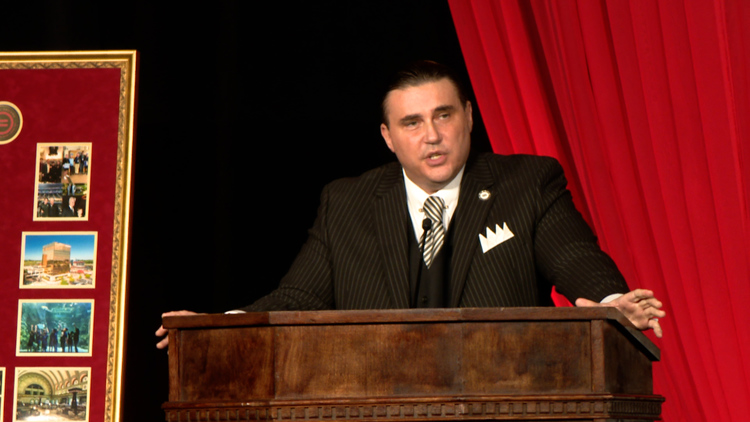The tour stop was organized by the Missouri Works Initiative, Missouri AFL-CIO, and Saint Louis Building and Construction Trades Council. They hosted North America’s Building Trades Unions (NABTU) event stop on its national multi-city road tour.
The Infrastructure Investment and Jobs Act (IIJA) will increase federal spending on infrastructure by about $550 billion over the next decade. Likewise, the Inflation Reduction Act (IRA) and Creating Helpful Incentives to Produce Semiconductors (CHIPS) Act will bolster U.S. competitiveness here and abroad.
NABTU represents more than 3 million skilled craft professionals in the United States and Canada. Monday’s event illustrated how union workers, business leaders, and government officials came together to ensure that union-trained workers are prepared to “meet the moment” as federal infrastructure and works projects come online.
The event included a tour of the Sheet Metal Workers SMART Local Union’s training center and brief speeches from labor leaders, government officials, apprentices, journey-level workers and business leaders. Themes revolved around the importance of industries, communities, politicians, building trades workers and others collaborating to take advantage of new opportunities birthed through sweeping federal legislation.
John Stiffler, executive secretary-treasurer, St. Louis Building and Construction Trades Council said regional stakeholders are prepared to meet the challenge as federal infrastructure investments come to St. Louis. Union groups in St. Louis are “focused on prioritizing diversity, equity and inclusion at all levels throughout the workforce development pipeline,” according to Stiffler.
St. Louis Mayor, Tishaura O. Jones welcomed the audience and emphasized the importance of 21st Century strategic, diversity-based alliances.
“As mayor, I am working to build a city for everyone to thrive no matter their background, zip code, color of their skin or where they live, and organized labor is a key part of that vision. Good-paying union jobs do more than benefit just a person or a household. They help support communities by lifting wages and standards for working people across the board.”
Jones also complimented St. Louis’ Building Union Diversity (BUD) that works to connect residents in the metro region with the growing opportunities in construction. Jones credited the program for helping break down barriers for a more inclusive, equitable city and construction industry.
“With a 92% graduation rate, BUD participants go on to do and build great things-from pipefitting to iron-working BUD primes our young people to enter the workforce with new opportunities and new skills.”
With billions of federal dollars through President Biden’s investment Acts, “there is no better time than now to enter the trades,” Jones stressed to thunderous applause.
State Senator Doug Beck (D-Affton), President, Missouri State Building and Construction Trades Council, broke down the money slated for Missouri.
“The Biden Administration has announced $4.1 billion in public infrastructure investments specifically for Missouri including $3.1 Billion for transportation projects, $110.2 million to make our communities more resilient and energy independent and $334.1 million to provide clean water across Missouri and improve water infrastructure including $101 million dedicated for lead pipe replacement,” Beck highlighted, adding: That’s a lot of work coming our way!”
Marc Morial, president and CEO of the National Urban League, was supposed to be the keynote speaker of the event but was sidelined by weather problems and flight delays. Traci Scott, vice president of Workforce Development at the National Urban League and Michael P. McMillan, president and CEO of The Urban League of Metropolitan St. Louis, spoke in Morial’s stead.
Scott gave an overview of the national Urban League.
“We’ve been around since 1911 and workforce development has been the baseline of what all of what the Urban League has done and does today.”
Scott said the Biden Administration, NABTU, the Urban League and others in the building and trade industries are sincere about addressing “all the deficiencies we’ve seen both 100 years ago and today. Because the country has seen “a bit of waning in support of unions,” it’s not of no consequence that we’ve seen a waning in the participation of African Americans in the middle class itself.”
With investments from the Department of Labor, Scott continued, the goal is to introduce at least 13,000 individuals to the trades in four states, Pennsylvania, Tennessee, Ohio and Missouri. Of the 13,000, 7,000 participants, Scott said, will come from underrepresented communities of color with 20% of those positions reserved for women. The Urban League recruits, accesses and refers individuals to the trades program.
McMillan said the Urban League is proud to be a part of the generation that “finally fixes this issue (of exclusion).”
“We’ve been talking about this for many, many decades; we have made many efforts over the years to be about change and do something significant,” McMillan explained, adding: “But as you heard…with four trillion dollars that’s going to be available to this country, this is the historic moment and historic opportunity that we’ve all been waiting for and it’s going to be on our watch to make this happen.”
For more information, visit nabtu.org.


